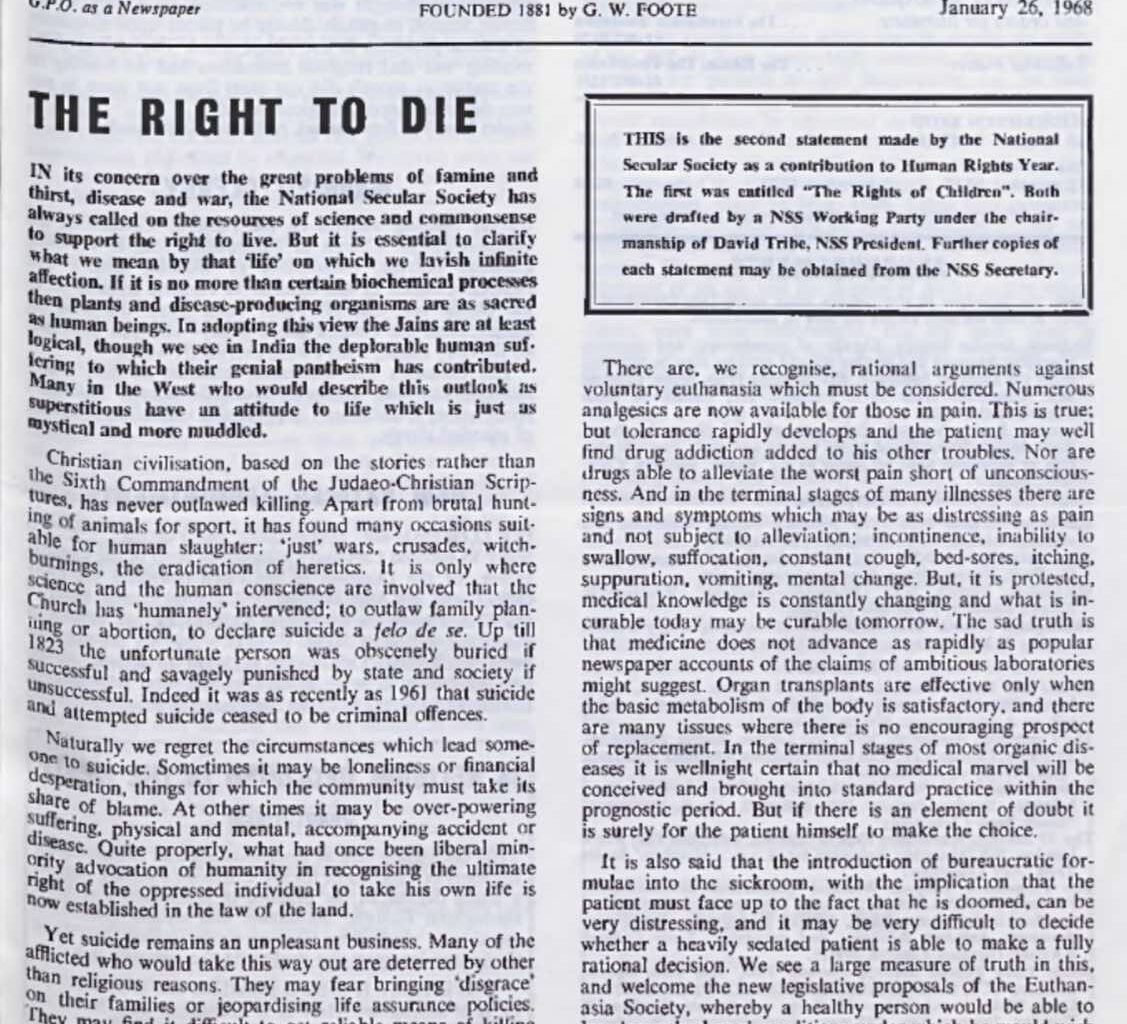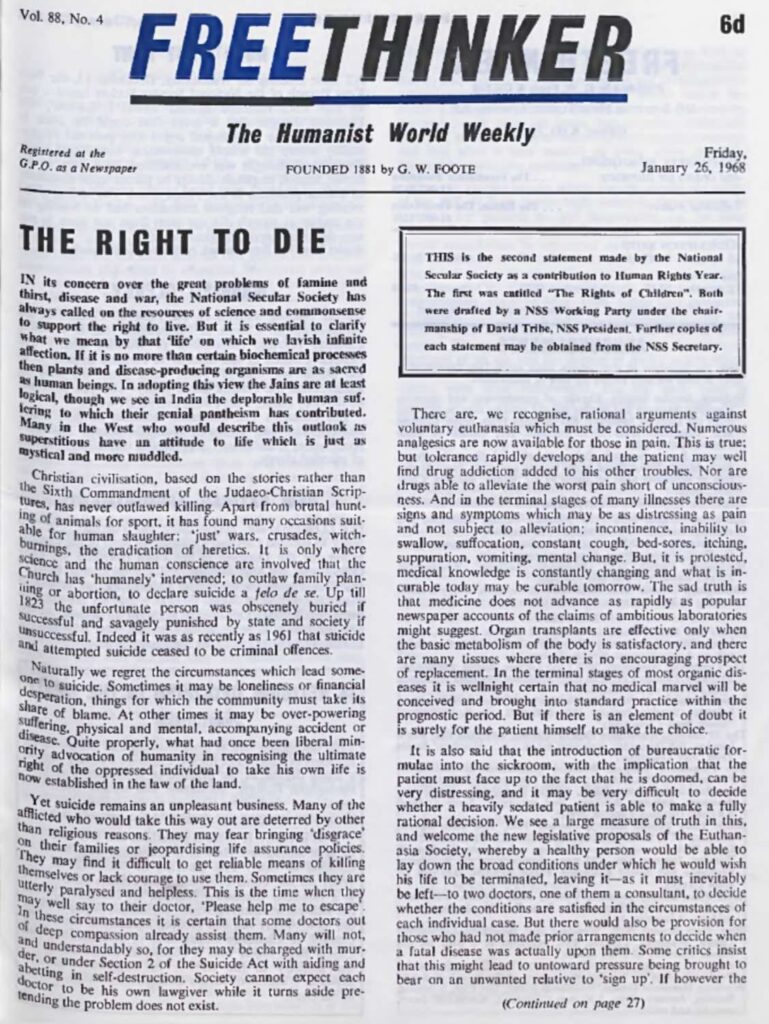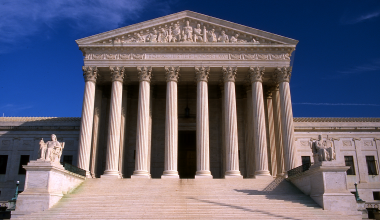With the passage of the second reading of the Terminally Ill Adults (End of Life) Bill in the House of Commons on 29 November, a milestone in a very old debate has been reached. The Bill is not law yet, and it is likely to face challenges and amendments as it progresses further through Parliament, but the likelihood is that sometime in the near future, assisted dying will finally become legal in England and Wales. So it seems a good time to look back at some of the coverage of this contentious argument in the Freethinker.
It is true, I think, that most secularists and humanists support assisted dying and that much, if not most, of the opposition to it comes from the religious. Still, the idea that this debate is one between the non-religious and the religious is a false one (not to mention that there is—sometimes quite heated—disagreement in secularist circles as to whether assisted dying is strictly to be counted among ‘our’ issues). Plenty of secular-minded people have opposed the legalisation of assisted dying and plenty of religious people have supported it. (Indeed, the vast majority of the British population, including 65% of Christians, supports it, as a recent Humanists UK-commissioned poll found. Interestingly, however, a Sky News poll conducted before the 29 November reading of the End of Life Bill found that many Brits thought the debate had been rushed and that 70% had concerns about undue pressure being placed on disabled people to pursue the assisted dying option.)
In any case, the Freethinker has aired both sides of the debate in its pages recently—or both secular humanist sides of it, at least. In April this year, Kevin Yuill published an article providing the humanist case against ‘assisted suicide and euthanasia’ (terminology is just one of the many thorny aspects of this debate). He concluded that
Legalising assisted dying would be a huge step in the wrong direction. It will lead to some people’s lives—on physical, or sometimes mental grounds—being deemed as not worth living. That would be a dire and dangerous situation. There is wisdom yet in the famous old Christian precept, Thou shalt not kill.
Yuill’s argument inspired many a critical email and comment, and in the end, Tony Akkermans penned a rejoinder in which he argued that opposing assisted dying is antithetical to humanism:
Kevin Yuill is free to choose to suffer an appalling death, should he have the misfortune to face such end-of-life circumstances. But his view that everyone else may not choose to avoid such an end is incompatible with the very heart of humanism.
Kevin Yuill gave a riposte to this rejoinder, but I think the point is clear: the assisted dying debate is a fierce one, and it does not split cleanly along religious/non-religious lines.
Other perspectives from recent years include looks at the role of bishops in the House of Lords (by former editor Emma Park) and the debate in France (by Jean-Luc Romero-Michel).
Travelling further back in time, assisted dying—or ‘voluntary euthanasia’—occupied the front page of the Freethinker’s 26 January 1968 issue in the form of a statement written by a National Secular Society (NSS) Working Party chaired by then-NSS President David Tribe for UNESCO’S International Year of Human Rights and entitled ‘The Right to Die’. This statement was in support of a bill drawn up and proposed by the Euthanasia Society (now Dignity in Dying) in 1967 which called for the right to die to be legalised (the statement was also reprinted as an NSS pamphlet). Unable to find a willing MP to introduce the bill in the Commons, the Euthanasia Society eventually got NSS member Lord Raglan to introduce it in the House of Lords in 1969 (it didn’t pass, of course).
In that same issue of the Freethinker, the Euthanasia Society’s C. R. Sweetingham contributed an article entitled ‘Euthanasia—A Human Right’ and an upcoming debate on ‘The Right to Die’ to be held in Conway Hall on 1 February was advertised. The 16 February issue featured a report on that debate and a couple of Freethinker readers weighed in on both the Conway Hall debate and the assisted dying debate in general in subsequent issues. On 1 March, for instance, Mrs A. Comino-Jones wrote:
In the February 16 issue, you quote Dr Cicely Saunders speaking at the NSS forum on euthanasia (February 1) at Conway Hall: “The main reason why we say ‘no’ to euthanasia is that to do otherwise would be to say ‘no’ to God”. You then add “Presumably because it is the antithesis of ‘Thy will be done’ ”. On the basis of this argument, using any medical or surgical skills to save the life of a dying person—or even using them to ease an ache or pain, or to help heal a cut finger—would also be saying ‘no’ to God, and interfering with His will. God must have intended the death, the ache, the cut finger, or it would not have happened. However, I doubt whether Dr Saunders, as a logical corollary to her original argument, would consider resigning her position as Medical Director of St Christopher’s Hospice.
No doubt there is much more material on the assisted dying (or assisted suicide or voluntary euthanasia) argument to be found in the Freethinker historical archive. Interested readers are invited to peruse the archive for themselves and report any interesting findings to editor@freethinker.co.uk. Meanwhile, below is reproduced the NSS pamphlet on assisted dying, with thanks to Keith Porteous Wood and Bob Forder for suggesting it be republished in the Freethinker today and for providing some valuable background information.










2 comments
Making it legal to assist a suicide and obliging the NHS to supply an assisted suicide service are distinct proposals and need to be disentangled.
Even if assisting a suicide is legalised it does not follow that anyone should be obliged to assist, least of all the taxpayer.
Doesn’t the taxpayer currently pay for keeping people alive and in misery against their will? So you are suggesting those opting for assisted suicide should pay for it privately thus putting financial barriers in the way of those who choose a route out of suffering?
Your email address will not be published. Comments are subject to our Community Guidelines. Required fields are marked *
Donate